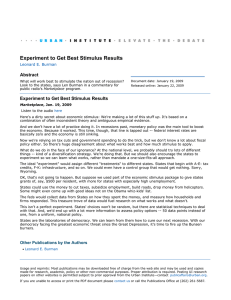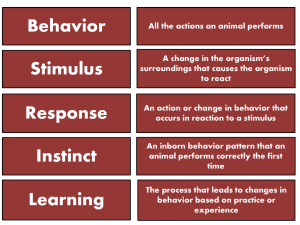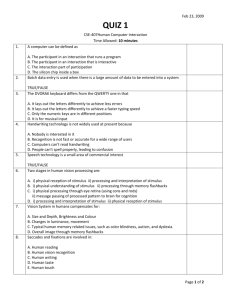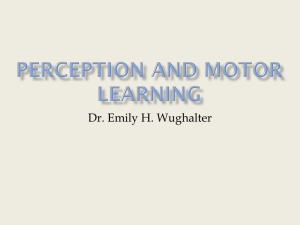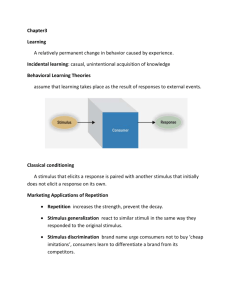This Is Not Your
advertisement
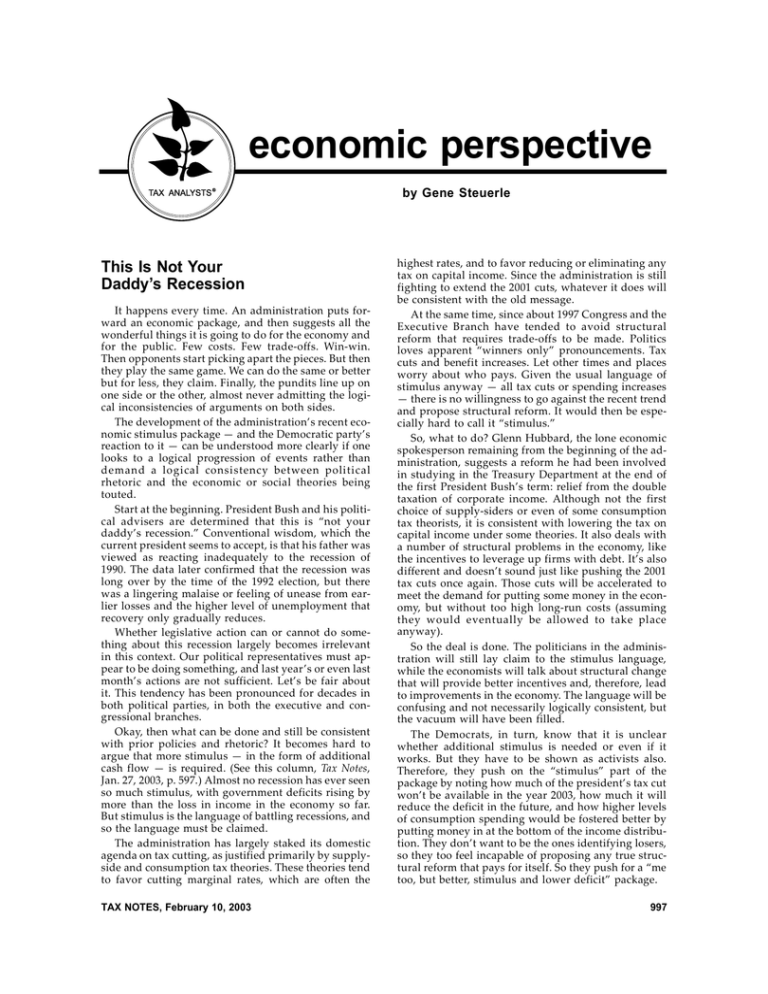
economic perspective TAX ANALYSTS ® This Is Not Your Daddy’s Recession It happens every time. An administration puts forward an economic package, and then suggests all the wonderful things it is going to do for the economy and for the public. Few costs. Few trade-offs. Win-win. Then opponents start picking apart the pieces. But then they play the same game. We can do the same or better but for less, they claim. Finally, the pundits line up on one side or the other, almost never admitting the logical inconsistencies of arguments on both sides. The development of the administration’s recent economic stimulus package — and the Democratic party’s reaction to it — can be understood more clearly if one looks to a logical progression of events rather than deman d a logical consistency between political rhetoric and the economic or social theories being touted. Start at the beginning. President Bush and his political advisers are determined that this is “not your daddy’s recession.” Conventional wisdom, which the current president seems to accept, is that his father was viewed as reacting inadequately to the recession of 1990. The data later confirmed that the recession was long over by the time of the 1992 election, but there was a lingering malaise or feeling of unease from earlier losses and the higher level of unemployment that recovery only gradually reduces. Whether legislative action can or cannot do something about this recession largely becomes irrelevant in this context. Our political representatives must appear to be doing something, and last year’s or even last month’s actions are not sufficient. Let’s be fair about it. This tendency has been pronounced for decades in both political parties, in both the executive and congressional branches. Okay, then what can be done and still be consistent with prior policies and rhetoric? It becomes hard to argue that more stimulus — in the form of additional cash flow — is required. (See this column, Tax Notes, Jan. 27, 2003, p. 597.) Almost no recession has ever seen so much stimulus, with government deficits rising by more than the loss in income in the economy so far. But stimulus is the language of battling recessions, and so the language must be claimed. The administration has largely staked its domestic agenda on tax cutting, as justified primarily by supplyside and consumption tax theories. These theories tend to favor cutting marginal rates, which are often the TAX NOTES, February 10, 2003 by Gene Steuerle highest rates, and to favor reducing or eliminating any tax on capital income. Since the administration is still fighting to extend the 2001 cuts, whatever it does will be consistent with the old message. At the same time, since about 1997 Congress and the Executive Branch have tended to avoid structural reform that requires trade-offs to be made. Politics loves apparent “winners only” pronouncements. Tax cuts and benefit increases. Let other times and places worry about who pays. Given the usual language of stimulus anyway — all tax cuts or spending increases — there is no willingness to go against the recent trend and propose structural reform. It would then be especially hard to call it “stimulus.” So, what to do? Glenn Hubbard, the lone economic spokesperson remaining from the beginning of the administration, suggests a reform he had been involved in studying in the Treasury Department at the end of the first President Bush’s term: relief from the double taxation of corporate income. Although not the first choice of supply-siders or even of some consumption tax theorists, it is consistent with lowering the tax on capital income under some theories. It also deals with a number of structural problems in the economy, like the incentives to leverage up firms with debt. It’s also different and doesn’t sound just like pushing the 2001 tax cuts once again. Those cuts will be accelerated to meet the demand for putting some money in the economy, but without too high long-run costs (assuming they would eventually be allowed to take place anyway). So the deal is done. The politicians in the administration will still lay claim to the stimulus language, while the economists will talk about structural change that will provide better incentives and, therefore, lead to improvements in the economy. The language will be confusing and not necessarily logically consistent, but the vacuum will have been filled. The Democrats, in turn, know that it is unclear whether additional stimulus is needed or even if it works. But they have to be shown as activists also. Therefore, they push on the “stimulus” part of the package by noting how much of the president’s tax cut won’t be available in the year 2003, how much it will reduce the deficit in the future, and how higher levels of consumption spending would be fostered better by putting money in at the bottom of the income distribution. They don’t want to be the ones identifying losers, so they too feel incapable of proposing any true structural reform that pays for itself. So they push for a “me too, but better, stimulus and lower deficit” package. 997 COMMENTARY / ECONOMIC PERSPECTIVE The public policy consequence is a rhetorical trap. No one really knows whether stimulus, in the classic sense of putting money in the economy, is useful at this time. But all politicians want to appear to be sensitive to the needs of the population. In wrapping themselves in the “stimulus” mantle, it becomes hard to engage in broader structural reform that pays for itself, and what reform may be proposed gets tied up and confused with the short-term stimulus question. 998 TAX NOTES, February 10, 2003
